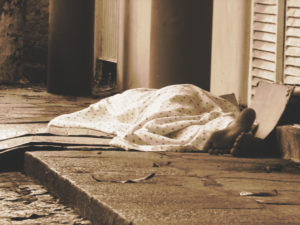In an editorial on the homelessness problem in California, the Los Angeles Times says that the recall candidates opposing California Gov. Gavin Newsom are doing nothing more than blowing hot air with their silly proposals.
The Times is right. But the problem is that the Times itself is blowing some warm air when it comes to homelessness. Not hot air, mind you, only warm air.

Licensed under Creative Commons
The hot air being blown by the Republican recall candidates includes putting homeless people into shelters, where they would be forced to confront their mental illness and substance-abuse problems, enlisting the help of churches, and having the state build housing or shelters.
What nonsense, as the Times correctly points out.
The Times hits the nail on the head with identifying the problem and gets oh so close to advancing the solution. It states:
By and large, people in California have become homeless because so little affordable housing is available. That’s a crisis that developed over the decades as elected state and city officials — pressured by NIMBY homeowners — fought density and did nothing to make it easier or affordable to build in this state. None of these candidates has offered clear solutions on how to change that — particularly because what would be required (rezoning, greater density, higher property taxes) is so politically volatile.
After getting so close to endorsing the only solution to the homelessness problem, which would have truly been impressive, the Times goes off the rails in its following and concluding paragraph:
Gov. Newsom has directed billions toward the acquisition of hotels, motels and apartment buildings to turn into housing for homeless people. He isn’t perfect, but at least he’s looking for creative ways to increase housing supply, not shelters.
There is but one solution to the homelessness problem: repeal zoning laws. Let the free-market reign. That would enable people to construct low-cost housing or mobile-home parks in areas in which zoning prohibits such things.
Zoning is really nothing more than central planning, a core principle of socialism. Rather than having government bureaucrats planning the production of goods, zoning authorizes the bureaucrats to plan the use of privately owned real property.
Over time, zoning became another version of urban renewal, the government program in the 1950s intended to eliminate “blight” in inner cities. The “blight” was housing in which the poor were living. The idea was that the planners were going to use zoning to make communities beautiful by eliminating the unsightly homes that the poor use or by preventing them from using houses for multiple families.
The result, needless to say, was to lock the poor out of housing market. The funny part of all this is that that result left economic interventionists scratching their heads. They just couldn’t understand what caused the homelessness problem. Meanwhile, while they were scratching their heads, they continued tightening up their zoning regulations.
In a society based on principles of private property and free markets, people are free to build whatever they want on whatever property they own, subject to one exception: If a private developer develops and subdivides a tract in which he sets forth minimum standards, such as lot size, house size, and density, then anyone who buys in that subdivision is subject to its rules.
But all other property is freely available to build on. If someone doesn’t want to risk a mobile-home park being built next to his house, then he should buy the adjoining property or move to a subdivision in which mobile homes are prohibited. Otherwise, when you buy a house or a business, you take your chances on what is built next door to you or nearby.
The American people lived without zoning for more than 100 years. That’s because, unlike today’s Americans, our American ancestors rejected socialism, including central planning, and chose the principles of private property and free markets.
Too bad the U.S. Supreme Court, in a 6-3 decision, upheld the constitutionality of zoning in 1926 in the case of Village of Euclid v. Ambler Reality Company. Our nation — and especially the homeless — would have been so much better off if the decision had gone the other way.



